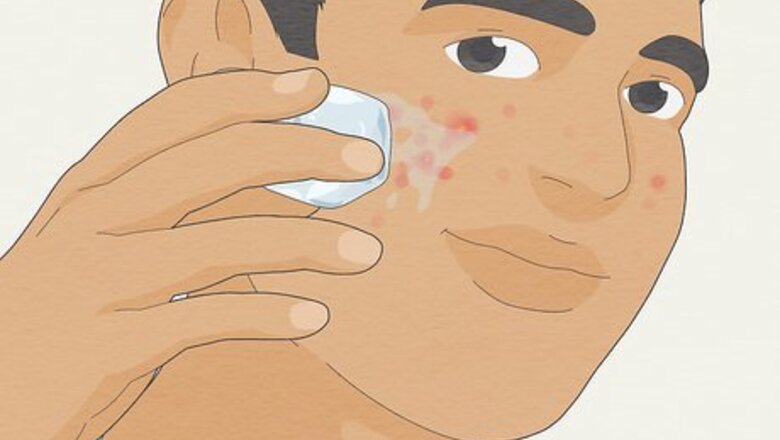
views
Home Remedies
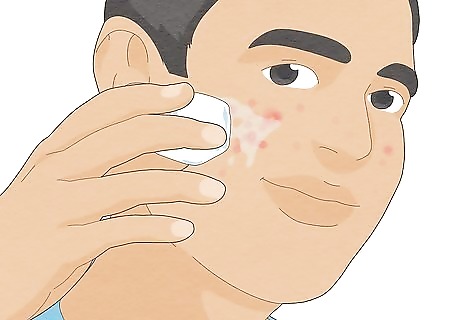
Ice surfaced pimples to reduce redness and swelling. Pimples get painful and bright because of inflammation, and what better way to cool everything down than with ice? Wrap an ice cube or ice pack in a clean towel, and hold it on an inflamed pimple for 5 minutes. Remove it for another 5 minutes before placing it back on for 5 more minutes. Continue alternating between putting the ice on and off for 20 to 30 minutes. Try this method whenever your pimple starts to hurt or about 3 times daily until it goes away. Ice won’t help blackheads or whiteheads go away because they don’t swell like pustules or cysts.
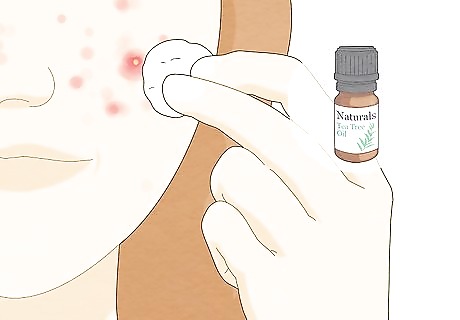
Dab a 5% tea tree oil solution on your pimple for a natural spot treatment. Tea tree oil or Melaleuca’s anti-inflammatory properties are proven to reduce acne. Simply mix together a solution of 1 part tea tree oil and 5 parts coconut oil or water, and use a cotton swab to rub it onto the pimple. Always dilute a homemade tea tree oil solution before applying it to your skin, as it can cause burns or irritation. If you don’t have tea tree oil at home, try using an acne lotion or cream with 5% tea tree oil instead. If you experience redness, itching, or stinging when using a tea tree oil treatment, wash it off immediately, as you may be having an allergic reaction.
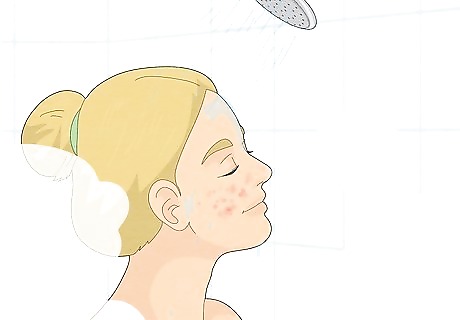
Apply a warm compress or steam to bring your pimple to the surface. If you feel a pimple starting to grow, avoid picking or squeezing it. Instead, take a long, hot shower or place a warm washcloth on the area. This will open your pores and help the pimple break through the skin faster. Heat can help extract blackheads and whiteheads.
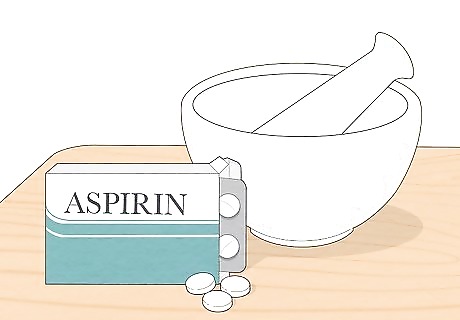
Make an aspirin paste to put on your pimple. Aspirin is an over-the-counter anti-inflammatory medication, making it a perfect DIY solution to reducing a pimple’s swelling. Simply grind up 5 to 7 uncoated aspirin tablets with 2 to 3 tbsp (30 to 45 mL) of water. Apply the paste to your pimple for 10 to 15 minutes once or twice a week. Make the paste thicker by adding a drop or two of honey or aloe gel. Although there’s limited scientific evidence on this remedy, it’s worth a try!
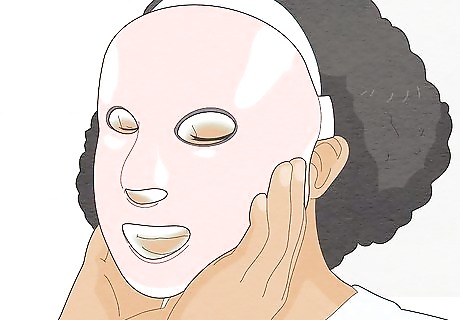
Treat your pimples with blue light to help them go away faster. Blue light is clinically proven to improve skin conditions and lessen the appearance of pimples. Schedule an LED light therapy appointment with your dermatologist or at your local spa, or purchase an LED mask or wand to perform regular treatments at home. The results from this treatment are not instantaneous, and it may take weeks or months before you notice a difference in your skin. Always follow an LED device's instructions and safety guidelines if performing the treatment yourself. If you have rosacea or another skin condition, skip this treatment as it could worsen your symptoms.
Over-the-Counter Treatments
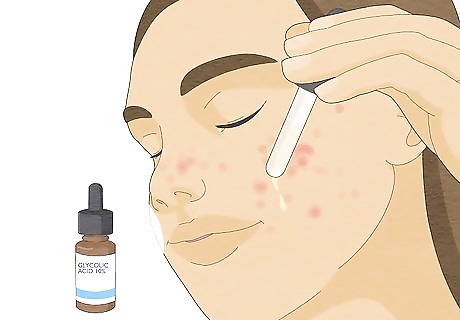
Use a salicylic or glycolic acid-based solution to dry out pimples. These acid-based products come in creams, lotions, cleansers, and wipes and have been proven to shrink pimples. Salicylic and glycolic acids dry out the skin, essentially pulling oil out of the pimple while shrinking the pore. Try wiping your face with Stridex pads twice a day to reduce inflammation. Wash your face with a salicylic acid-based cleanser to remove any excess oils. Although these products reduce the size of pimples, they may also cause skin peeling, stinging, and dryness. Try using a non-comedogenic moisturizer afterwards to combat these side effects.
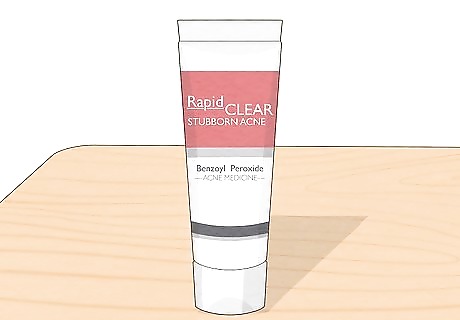
Put a benzoyl peroxide-based treatment on your pimple to shrink it. Benzoyl peroxide is a popular acne treatment because of its antibacterial properties. This organic acid can help dry out and minimize pores while reducing the risks of infection. Simply follow the directions on your chosen product’s label and apply as instructed (typically once or twice a day). If you have sensitive skin, you may experience skin dryness, redness, or flaking while using a benzoyl peroxide-based cream, gel, or lotion. Apply a non-comedogenic moisturizer when you’re not using the treatment to keep your skin soft and smooth.

Use a sulfur acne treatment to stop acne in its tracks. Sulfur is a natural element that repels the bacteria P. acnes which causes acne. Its antimicrobial properties stop the bacteria’s growth, lessening your chance of getting more pimples. Try washing your face with a sulfur-based cleanser, using a sulfur spot treatment once or twice a day, or relaxing with a sulfur-based face mask once a week. Sulfur doesn’t stop hormonal acne but can keep present acne at bay.
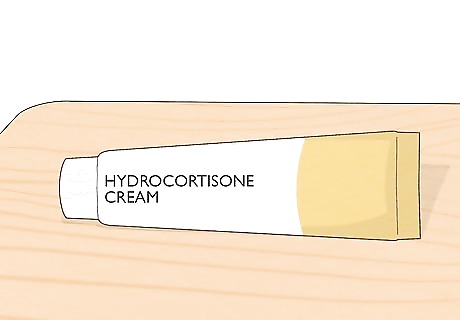
Apply a hydrocortisone cream to stubborn acne. This cream could be your saving grace if you’re dealing with severe breakouts that leave your face puffy, swollen, and/or itching. Talk to your doctor about whether or not this treatment plan is best for you. They’ll also be able to instruct you on how often to apply the cream. For some, hydrocortisone cream can worsen pimples, so always talk to your doctor before trying something new.
Acne Prevention

Try taking zinc or fish oil supplements to clear your skin. Sometimes, acne occurs when there’s something off in the body. Some studies have shown that those with acne have less zinc in their bodies than those who don’t have acne. Additionally, fish oil contains omega-3 fatty acids, which are proven to lessen acne swelling. So why not add a few new vitamins to your routine and see if your skin changes for the better?
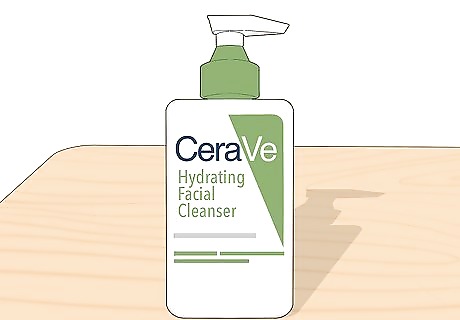
Wash your face regularly to keep your skin nice and clean. Acne and pimples are caused by oil build-up, bacteria, and dead skin cells. Making sure your face is clean and oil free can help stop pimples from forming. Wash your face with a gentle facial cleanser without alcohol and lukewarm water twice a day and after you sweat. Avoid touching your face whenever you can, as the oils from your hands can transfer to your face and cause pimples. Acne can also be caused by hormones, genetics, and medications. And although washing your face can’t change those factors, it can help prevent pimples from growing.
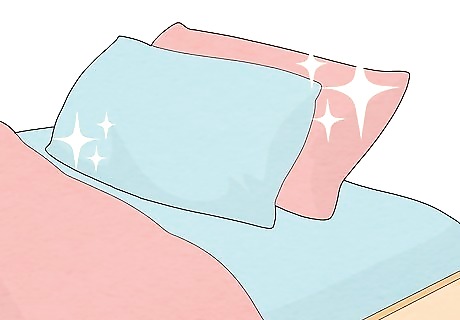
Change your pillowcase every week to prevent future pimples. If you have oily skin or are prone to acne, try washing your pillowcase once a week. This destroys any lingering bacteria and oils from your restful nights, giving you a clean slate to sleep easy on!
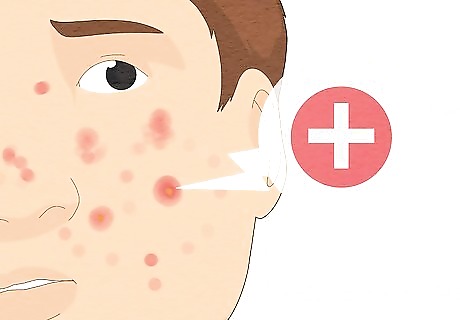
Seek help from a dermatologist if your acne worsens. Some pimples and acne cases can be more severe or stubborn than others. If your home remedies and over-the-counter treatments don’t work, take a deep breath and call your doctor. They’ll be able to determine if there are any underlying problems out of your control and provide you with the best personalized solutions.


















Comments
0 comment